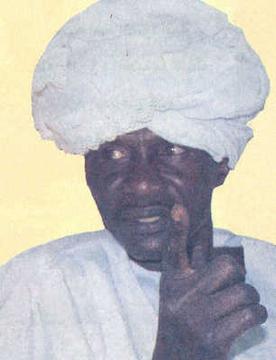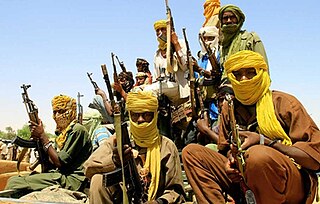Safita al-Ghunomab | |
|---|---|
Village | |
| Country | |
| State | |
| Time zone | UTC+2 (CAT) |
Safita al-Ghunomab is a village in Gezira State, Sudan. [1]
Safita al-Ghunomab | |
|---|---|
Village | |
| Country | |
| State | |
| Time zone | UTC+2 (CAT) |
Safita al-Ghunomab is a village in Gezira State, Sudan. [1]
The RSF killed dozens of civilians in the village in a campaign of statewide massacres in October 2024. [2]

Sudan, officially the Republic of the Sudan, is a country in Northeast Africa. It borders the Central African Republic to the southwest, Chad to the west, Libya to the northwest, Egypt to the north, the Red Sea to the east, Eritrea and Ethiopia to the southeast, and South Sudan to the south. Sudan has a population of 50 million people as of 2024 and occupies 1,886,068 square kilometres, making it Africa's third-largest country by area and the third-largest by area in the Arab League. It was the largest country by area in Africa and the Arab League until the secession of South Sudan in 2011; since then both titles have been held by Algeria. Sudan's capital and most populous city is Khartoum.

The Sudanese Armed Forces are the military forces of the Republic of the Sudan. In 2011, IISS estimated the forces' numbers at 109,300 personnel. The CIA estimates that, before the current war in Sudan broke out in 2023, the SAF may have had up to 200,000 personnel. In 2024, Al Jazeera reported that the SAF has around 300,000 personnel.

Darfur is a region of western Sudan. Dār is an Arabic word meaning "home [of]" – the region was named Dardaju while ruled by the Daju, who migrated from Meroë c. 350 AD, and it was renamed Dartunjur when the Tunjur ruled the area. Darfur was an independent sultanate for several hundred years until 1874, when it fell to the Sudanese warlord Rabih az-Zubayr. The region was later invaded and incorporated into Sudan by Anglo-Egyptian forces in 1916. As an administrative region, Darfur is divided into five federal states: Central Darfur, East Darfur, North Darfur, South Darfur and West Darfur. Because of the War in Darfur between Sudanese government forces and the indigenous population, the region has been in a state of humanitarian emergency and genocide since 2003. The factors include religious and ethnic rivalry, and the rivalry between farmers and herders.

Gezira, also spelt Al Jazirah, Al Jazeera and Al Jazira, is one of the 18 states of Sudan. The state lies between the Blue Nile and the White Nile in the east-central region of the country. The state has a population of 5,096,920 as of 2018, and an area of 27,549 km2.

Juba is the capital and largest city of South Sudan. The city is situated on the White Nile and also serves as the capital of the Central Equatoria State. It is the most recently declared national capital and had a population of 525,953 in 2017. It has an area of 52 km2 (20 sq mi), with the metropolitan area covering 336 km2 (130 sq mi).

The Sudan Liberation Movement/Army is a Sudanese rebel group active in Darfur, Sudan. It was founded as the Darfur Liberation Front by members of three indigenous ethnic groups in Darfur: the Fur, the Zaghawa, and the Masalit, among whom were the leaders Abdul Wahid al-Nur of the Fur, Khamis Abakar of the Masalit and Minni Minnawi of the Zaghawa.

The War in Darfur, also nicknamed the Land Cruiser War, was a major armed conflict in the Darfur region of Sudan that began in February 2003 when the Sudan Liberation Movement (SLM) and the Justice and Equality Movement (JEM) rebel groups began fighting against the government of Sudan, which they accused of oppressing Darfur's non-Arab population. The government responded to attacks by carrying out a campaign of ethnic cleansing against Darfur's non-Arabs. This resulted in the death of hundreds of thousands of civilians and the indictment of Sudan's president, Omar al-Bashir, for genocide, war crimes, and crimes against humanity by the International Criminal Court.

The African Union-United Nations Hybrid Operation in Darfur was a joint African Union (AU) and United Nations (UN) peacekeeping mission formally approved by United Nations Security Council Resolution 1769 on 31 July 2007, to bring stability to the war-torn Darfur region of Sudan while peace talks on a final settlement continue.

Ali Muhammad Ali Abd-Al-Rahman, commonly known as Ali Kushayb, is a senior Janjaweed commander who supported the Sudanese government against Darfur rebel groups during the Omar al-Bashir presidency. He was indicted by the International Criminal Court (ICC) for war crimes. He was known as aqid al oqada and was active in Wadi Salih, West Darfur.

Aweil is a city located in South Sudan. It is the capital of Northern Bahr el Ghazal state and the administrative centre of Aweil Center County. It is also a service centre for the surrounding villages. Refugees, war displaced returnees, nomadic cattle keepers and local families moving seasonally with their animals to source water give Aweil a mobile population.

The Sudan People's Liberation Movement–North, or SPLM–N, is a political party and militant organisation in the Republic of the Sudan, based in the states of Blue Nile and South Kordofan. The group's armed forces are formally known as the Sudan People's Liberation Army–North or SPLA–N. In 2011 when South Sudan broke away from Sudan to form a new country, most of the Sudan People's Liberation Movement (SPLM) and Army (SPLA) left with it, leaving units remaining across the border in Sudan to form the SPLA–N.

The Sudanese conflict in South Kordofan and Blue Nile was an armed conflict and insurgency in the Sudanese states of South Kordofan and Blue Nile between the Sudanese Armed Forces (SAF) and the Sudan People's Liberation Movement–North (SPLM-N), a northern affiliate of the Sudan People's Liberation Movement (SPLM) in South Sudan. After some years of relative calm following the 2005 agreement which ended the second Sudanese civil war between the Sudanese government and SPLM rebels, fighting broke out again in the lead-up to South Sudan independence on 9 July 2011, starting in South Kordofan on 5 June and spreading to the neighboring Blue Nile state in September. SPLM-N, splitting from newly independent SPLM, took up arms against the inclusion of the two southern states in Sudan with no popular consultation and against the lack of democratic elections. The conflict is intertwined with the War in Darfur, since in November 2011 SPLM-N established a loose alliance with Darfuri rebels, called Sudan Revolutionary Front (SRF).

The Republic of South Sudan established relations with sovereign states and international organizations following independence on 9 July 2011. South Sudan's former ruling country of Sudan was the first state in the world to recognize South Sudan.

South Sudan, officially the Republic of South Sudan, is a landlocked country in East Africa. It is bordered on the north by Sudan; on the east by Ethiopia; on the south by the Democratic Republic of the Congo, Uganda and Kenya; and on the west by the Central African Republic. South Sudan's diverse landscape includes vast plains and plateaus, dry and tropical savannahs, inland floodplains, and forested mountains. The Nile River system is the defining physical feature of the country, running south to north across its center, which is dominated by a large swamp known as the Sudd. South Sudan has a population of 12.7 million. Juba is the capital and largest city.

The Rapid Support Forces is a paramilitary force formerly operated by the government of Sudan. The RSF grew out of, and is primarily composed of, the Janjaweed militias which previously fought on behalf of the Sudanese government. Its actions in Darfur were deemed crimes against humanity by Human Rights Watch.

The Darfur genocide was the systematic killing of ethnic Darfuri people during the War in Darfur. The genocide, which was carried out against the Fur, Masalit and Zaghawa ethnic groups, led the International Criminal Court (ICC) to indict several people for crimes against humanity, rape, forced transfer and torture. An estimated 200,000 people were killed between 2003 and 2005. Other sources estimate that between 2003 and 2008, the conflict resulted in about 300,000 civilian deaths and about 2.7 million displaced civilians.

Abdel Fattah al-Burhan Abdelrahman al-Burhan is a Sudanese army general who is the de facto ruler of Sudan. Following the Sudanese Revolution in April 2019, he was handed control of the military junta, the Transitional Military Council, a day after it was formed, due to protesters' dissatisfaction with the establishment ties of initial leader Ahmed Awad Ibn Auf. He served as chairman of the TMC until a draft constitutional declaration signed with civilians went into effect on 17 August and a collective head of state Transitional Sovereignty Council was formed, also to be initially headed by al-Burhan.

Mohamed Hamdan Dagalo, generally referred to mononymously as Hemedti, is a Sudanese military officer and the current head of the paramilitary Rapid Support Forces (RSF). A Janjaweed leader from the Rizeigat tribe in Darfur, he was the Deputy head of the Transitional Military Council (TMC) following the 2019 Sudanese coup d'état. Since 2013, Hemetti has commanded the RSF. He was considered by The Economist to be the most powerful person in Sudan as of early July 2019.

The Permanent Representative of Romania to the United Nations is currently Cornel Feruță since 16 September 2022. Romania joined the United Nations (UN) on 14 December 1955.
Sudan is a sub-district located in al-Radmah District, Ibb Governorate, Yemen. Sudan had a population of 7014 according to the 2004 census.